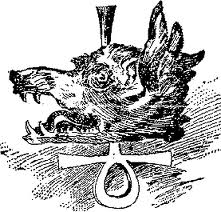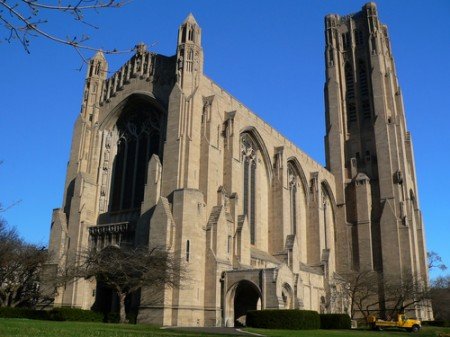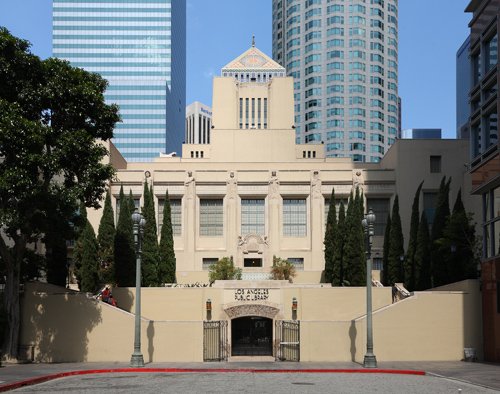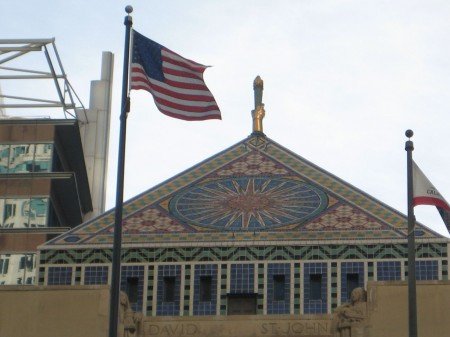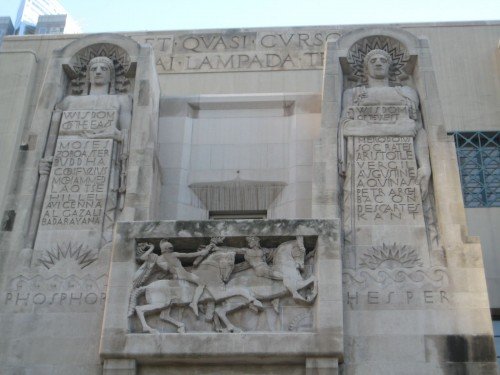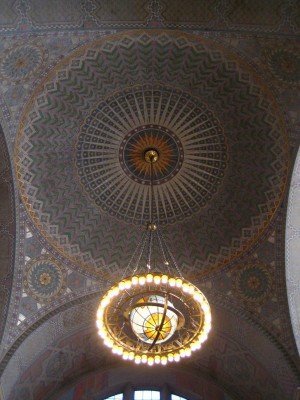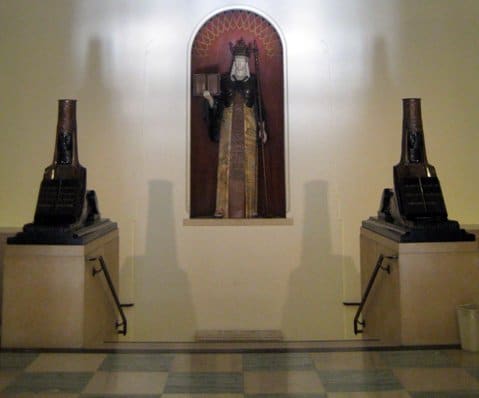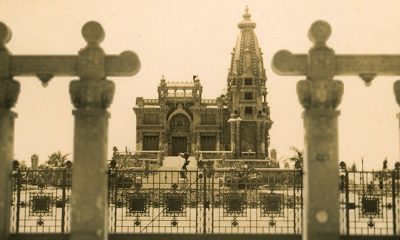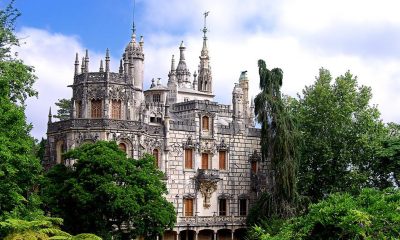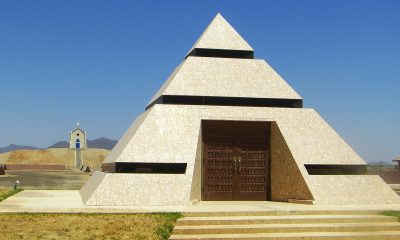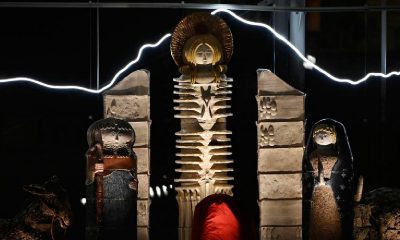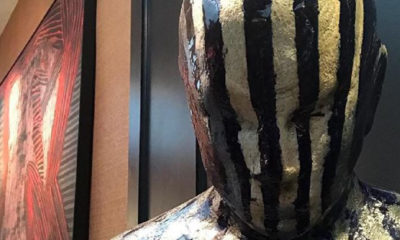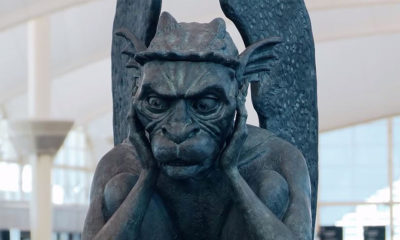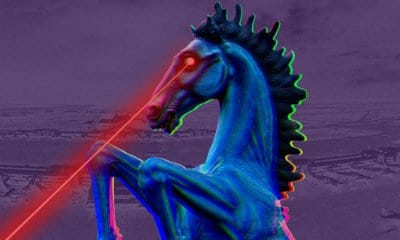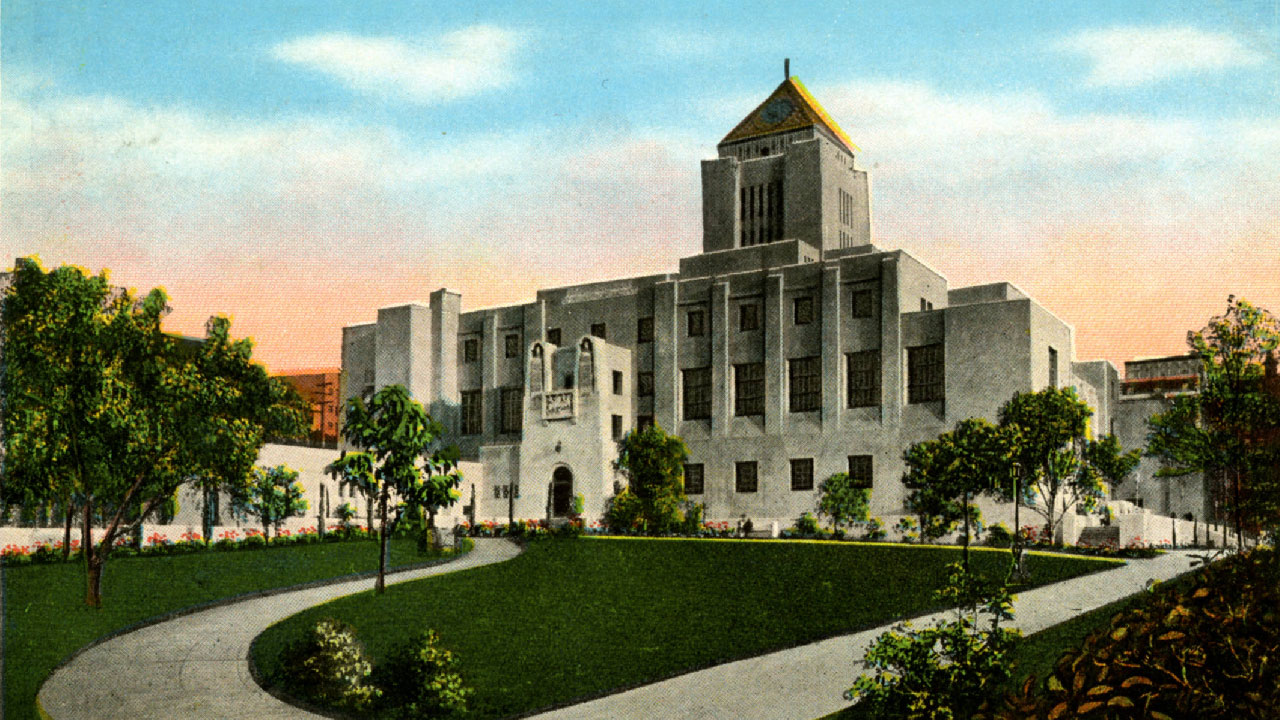
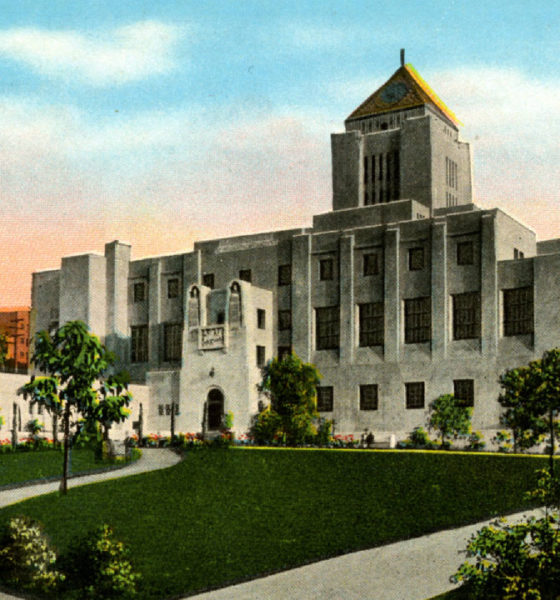
Sinister Sites
The Occult Symbolism of the Los Angeles Central Library
More often than not, central libraries are more than mere buildings containing books. They’re landmarks designed to impress with stunning architecture and symbolic art. The Los Angeles Central Library is certainly no exception. And look at its symbolism reveals an important fact: The Library is actually a temple of the occult elite’s Luciferian philosophy.
Built in 1926, the Central Library is an important landmark of downtown Los Angeles. It is the central piece of one of the largest publicly funded library systems in the world, the Los Angeles Public Library (LAPL). Most touristic pamphlets describe the building’s design to be inspired by “ancient Egyptian and Mediterranean Revival architecture”. As we will see, this choice of design is not simply an aesthetic one, it rather recalls ancient mystery schools of Antiquity. In fact, after decoding the library’s many esoteric features, we can safely say that the building is mainly inspired by Freemasonry, which is, in turn, heavily steeped in ancient Egyptian and Mediterranean occultism.
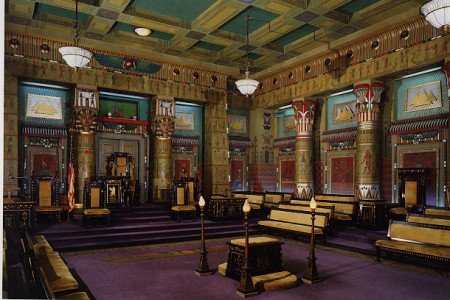
The Egyptian Room of a Masonic Lodge attests to the great importance of Egyptian mysteries in Masonic lore.
The Library’s tiled pyramid, two sphinxes, celestial mosaics and other details turn this public space into a true occult temple. Furthermore, the library is definitely built with an elitist state of mind. The true meaning of the art on display seems to be solely intended for initiates of secret societies and not the masses. Before we examine the building’s most important features, let’s look at the background of its builders.
Elite Architect: Bertram Goodhue
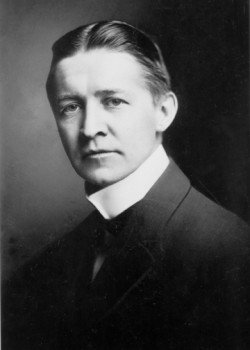
Bertram Grosvenor Goodhue, architect of numerous buildings of power.
The LA Central Library was designed by Bertram Grosvenor Goodhue, a prominent architect who was recognized and hired by America’s most powerful people. His works include governmental and military buildings, churches, libraries and the private houses of politicians.
One of the most recognized elite buildings designed by Goodhue is the headquarters of the Wolf’s Head Society – a secret society of Yale University. Along with the notorious Skull & Bones and Scroll & Key – the two other secret societies found at Yale – Wolf’s Head functions are quite similar to Freemasonry: It is a discreet yet major force influencing one of America’s most elite universities. It has held within its ranks members who went on to become prominent politicians, diplomats, lawyers, and athletes.
Perhaps Goodhue’s most notable project is the Rockefeller Memorial Chapel of the University of Chicago. Commissioned by America’s most powerful tycoon, John D. Rockefeller, the ecumenical Chapel is used for various religious celebrations. Rockefeller stated that the Chapel was meant to be the campus’ “central and dominant feature”.
The Chapel was designed in collaboration with Lee Lawrie, America’s foremost architectural sculptor. The duo worked on several other important projects such as Nebraska’s State Capitol and the Los Angeles Central Library, the subject of this article.
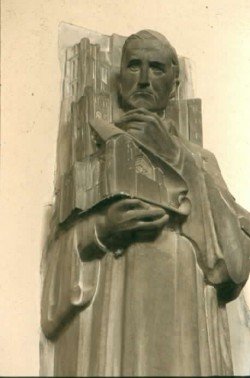
Sculpture of Bertram Goodhue holding the Rockefeller Chapel by the Rockefeller’s favorite sculptor, Lee Lawrie.
Elite Sculptor: Lee Lawrie
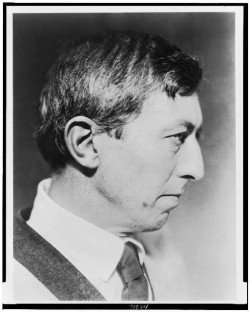
Lee Lawrie
Born in Germany in 1877, Lawrie came to the United States at the age of 5. After learning the craft from some of America’s leading artists, Lawrie collaborated with Goodhue on several projects and became America’s leading sculptor. His unique style and his knowledge of occult symbolism, ancient mysteries, and Masonic principles apparently made him the elite’s artist. Some of his high-profile commissions include the allegorical relief panels of the United States Senate, the Louisiana State Capitol, the statue of George Washington at the National Cathedral in Washington D.C and the Harkness Tower of Yale University.
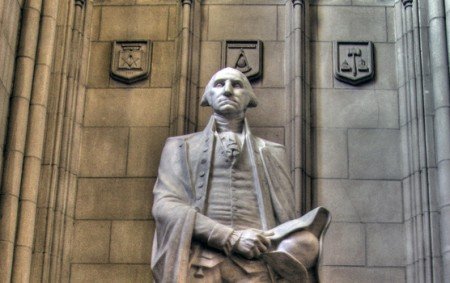
Lawrie’s statue of George Washington at the National Cathedral. Notice the Masonic Square and Compass behind him.
Lawrie’s most recognizable works are however displayed at the Rockefeller Center.
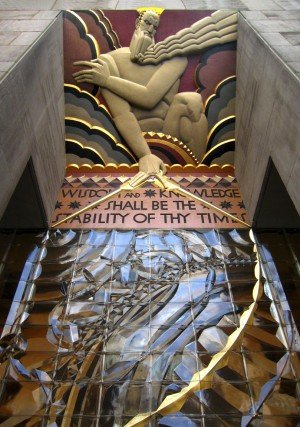
Lawrie’s Wisdom, above the main entrance of 5, Rockefeller Center, NY. The sculpture depicts a gnostic demi-urge holding a Masonic compass.
As described in a previous Vigilant Citizen article entitled Sinister Sites: Rockefeller Center, the complex built by John D. Rockefeller is filled with symbolic art describing the elite’s Luciferian philosophy based on the acquisition of divine knowledge (more on this later). Another important piece conceived by Lawrie at the Rockefeller Center is the statue of Atlas.
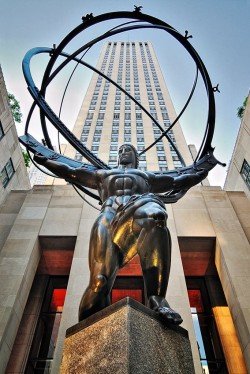
Lee Lawrie’s Atlas at Rockefeller Center.
Atlas is used by the ruling class as a metaphor “for the people who produce the most in society”, and therefore “holding up the world” in a metaphorical sense. Not surprisingly, Atlas is associated with some of the most important works of fictions describing the point of view of the elite.
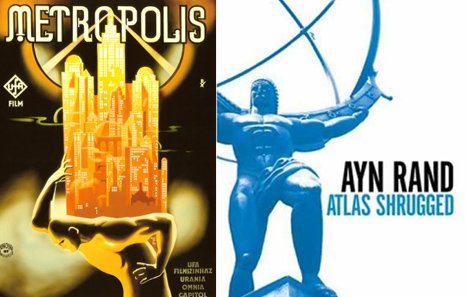
Fritz Lang’s Metropolis and Ayn Rand’s Atlas Shrugged: two classic works of fiction describing the vision of the world’s occult elite. Both work’s promotional material feature Atlas, a metaphor for the elite “upholding the world”.
Knowing that Goodhue and Lawrie produced symbolic architecture for America’s most prominent tycoons, politicians, and institutions, would you be surprised if the Central Library contained the same?
The Central Library
The library was originally built in 1926 by Bertram Goodhue. According to the Library’s documentation, the architecture’s central theme revolved around “illumination through the light of learning”. Due to an arson fire in 1986, the building underwent extensive renovations and expansion – but the central theme was faithfully respected. The artwork’s spiritual and esoteric undertones make the entire complex a “temple of illumination”. It is replete with profound mystical symbolism, sacred geometry, proportions, and allusions to important occult works. The Los Angeles Central Library and the Rockefeller Center are very similar in this regard – not surprising, as Lee Lawrie masterminded both complexes. As it is the case for the Rockefeller Center, the torch of Illumination, representing divine knowledge, is the most important symbol of the Library.
The Pyramid of Illumination
Sitting at the top of the Library is probably the complex’ most distinctive feature: A tiled pyramid topped by a golden hand holding a torch. Other than being beautiful and decorative, the Library’s apex has a deep occult meaning, clearly inspired by Freemasonry.
First, in occult lore, the pyramid is considered to be the ultimate symbol of the Mysteries. It represents the transition from the material plane to the spiritual world. From the square-shaped base of the pyramid (representing the material world) rise, in mathematical perfection, four triangles (representing divinity). According to many occult researchers, the pyramids of Ancient Egypt were most likely used for the purposes of initiation, where candidates were led to the path of Illumination.
“The more the great Hierophants were at pains to conceal their absolute Science, the more they sought to add grandeur to and multiply its symbols. The huge pyramids, with their triangular sides of elevation and square bases, represented their Metaphysics, founded upon the knowledge of Nature.“
– Albert Pike, Morals and Dogma
On each side of the pyramid is a sun symbol, the most visual ancient representation of deity.
“The adoration of the sun was one of the earliest and most natural forms of religious expression. Complex modern theologies are merely involvements and amplifications of this simple aboriginal belief. The primitive mind, recognizing the beneficent power of the solar orb, adored it as the proxy of the Supreme Deity.”
– Manly P. Hall, The Secret Teachings of All Ages
Although the sun (or sunburst) is the most common occult symbol to represent the divine, it is however not directly worshiped as a god. It is a visual representation of the divinity. For this reason, the Central Library is replete with references to the sun.
In all the histories of the Gods and Heroes lay couched and hidden astronomical details and the history of the operations of visible Nature; and those in their turn were also symbols of higher and profounder truths. None but rude uncultivated intellects could long consider the Sun and Stars and the Powers of Nature as Divine, or as fit objects of Human Worship; and they will consider them so while the world lasts ; and ever remain ignorant of the great Spiritual Truths of which these are the hieroglyphics and expressions.
— Albert Pike, Morals and Dogma
The Luciferian Torch
Above the pyramid is golden hand holding a torch. There is a reason why this symbol is sitting above all others in the building: It is a perfect representation of the building’s philosophy, Luciferianism.
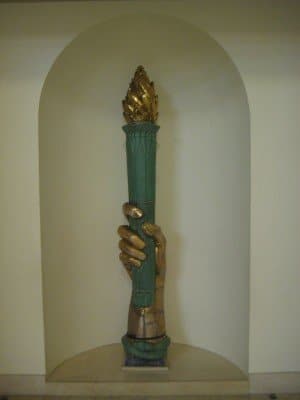
The original torch is on display inside the Library. There, we can see more of the torch’s detail, including the serpent of knowledge intertwining its base.
In Latin, the word “Lucifer” means “light bearer”. In occult symbolism, light and fire esoterically represent divine knowledge and enlightenment. A hand holding a lit torch, therefore, represents man’s ascent to divinity through the teachings of the Mysteries. The Gnostic interpretation of the story of the Genesis considers the snake (Lucifer) as a positive figure. It has given humans the intellectual faculties to reason and to ascend to divinity by their own means.
“Luciferianism represents the ultimate inversion of good and evil. The formula for this inversion is reflected by the narrative paradigm of the Gnostic Hypostasis myth. As opposed to the original Biblical version, the Gnostic account represents a “revaluation of the Hebraic story of the first man’s temptation, the desire of mere men to ‘be as gods’ by partaking of the tree of the ‘knowledge of good and evil.”
– Carl A. Raschke,The Interruption of Eternity: Modern Gnosticism and the Origins of the New Religious Consciousness
In occult teachings, Lucifer is not an existing being and is not equal to Satan. While Satan is esoterically associated with the descent to materiality, Lucifer represents the ascent to divinity using the cognitive powers of man. Through the acquisition of the knowledge of the Mysteries, an initiate has the:
“opportunity to erase the curse of mortality by direct encounter with the patron deity, or in many instances by actually undergoing an apotheosis, a transfiguration of human into divine”.
– Ibid.
Masonic authors such as Albert Pike and Albert G. Mackey have referred to the “Luciferian path” and the “energies of Lucifer” to describe the “search for light”. The term “Luciferian” is therefore used in the scholarly sense of “bringing enlightenment”. Masonic scholars often invoke Prometheus, who stole fire from the gods to bring to man, to describe this concept. For this reason, Prometheus is the central figure of the Rockefeller Center.
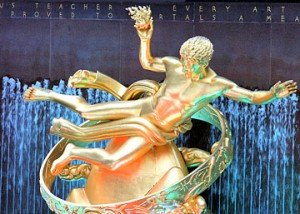
Prometheus, the Hellenic equivalent of Lucifer, bringing divine knowledge to humanity at Rockefeller Center.
The references to Lucifer in this library do not stop here.
The Western Facade – Phosphor and Hesper
Conceived by Lee Lawrie, the Western facade of the Library is another nod to the Mystery schools. Two human figures are depicted with the names “Phosphor” and “Hesper” underneath them. This apparently minor detail is perhaps the most significant.
Phosphor (or phosphorus) is the Latin word for the planet Venus in the morning, also referred to as the “Morning Star” or the “bringer of light”. Those terms are synonymous with Lucifer.
“Believing Venus to be two bodies, the Ancient Greeks called the morning star Φωσφόρος, Phosphoros(Latinized Phosphorus), the “Bringer of Light” or Ἐωσφόρος, Eosphoros (Latinized Eosphorus), the “Bringer of Dawn”. The evening star they called Hesperos (Latinized Hesperus) (Ἓσπερος, the “star of the evening”). By Hellenistic times, the ancient Hesperos would be translated into Latin as Vesper and Phosphoros as Lucifer (“Light Bearer”), a poetic term later used to refer to the fallen angel cast out of heaven.
– William Sherwood Fox, The Mythology of All Races: Greek and Roman
Hesper (or Vesperus) refers to Venus in the evening, the evening star.
“The disciples of Pythagoras also highly revered the planet Venus, because it was the only planet bright enough to cast a shadow. As the morning star, Venus is visible before sunrise, and as the evening star it shines forth immediately after sunset. Because of these qualities, a number of names have been given to it by the ancients. Being visible in the sky at sunset, it was called vesper, and as it arose before the sun, it was called the false light, the star of the morning, or Lucifer, which means the light-bearer”.
– Manly P. Hall, The Secret Teachings of All Ages
So Phosphor and Hesper are two words signifying the same entity, Venus, a celestial body occultly associated with Lucifer, at different stages of evolution. The figure representing Phosphor holds the names of Eastern philosophers such as Moses, Zoroaster, and Buddha, while Hesper holds the name of Western thinkers such as Socrates, Francis Bacon and Immanuel Kant. These historical figures have not been chosen at random: they all play important roles in the teachings of the Mystery Schools. In fact, Francis Bacon, René Descartes, and Immanuel Kant are central figures of the revival of modern Rosicrucianism and Freemasonry in Western civilization.
At the top of the wall is the Latin saying “et quasi cursores vitai lampada tradunt”. This is a quote from the Roman poem De Rerum Natura (On the Nature of the Universe) written by Lucretius and can be translated to “And like runners they pass on the torch of life“. The “torch of life” can be equated to the occult Mysteries, the hidden knowledge passed down from generation to generation through secret societies. Between Phosphor and Hesper, we see a cavalier passing the “torch of life”, or occult knowledge, to the next generation and from the East to the West.
The western facade of the Library, which also serves as the main entrance, is, therefore, a very significant piece representing the enduring existence of mystery schools through Luciferian philosophy. All of this, and we haven’t even stepped inside the building.
Illuminated Globe
Situated right under the pyramid on the top of the building, this globe chandelier is composed of cast bronze and, according to the Library’s documentation, weighs one ton. It was designed by Goodhue associates and modeled by Lee Lawrie.
The globe is surrounded by a ring containing the signs of the zodiac and is illuminated by 48 lights. The ring is attached to chains leading to the sunburst on the ceiling. As seen earlier, the sunburst is an ancient symbol representing divinity. This design is reminiscent of qabbalistic engravings representing the 72 names of God.
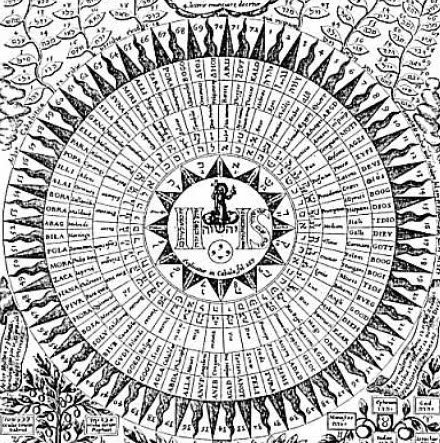
The seventy-two names of God from Kircher’s OEdipus Ægyptiacus. Like the library’s globe chandelier, this qabbalistic engraving bears the symbols of the planets and the signs of the zodiac.
Do the lights surrounding the globe represent the “circle of the illuminated”, the hidden rulers of the earth, who are connected to divinity through Gnosis? Do the 48 lights, mirroring the 48 sunrays, represent the hermetic axiom “As Above, so Below”?
“Despite statements to the contrary, Masonry is a religion seeking to unite God and man by elevating its initiates to that level of consciousness whereon they can behold with clarified vision the workings of the Great Architect of the Universe. From age to age the vision of a perfect civilization is preserved as the ideal for mankind. In the midst of that civilization shall stand a mighty university wherein both the sacred and secular sciences concerning the mysteries of life will be freely taught to all who will assume the philosophic life. Here creed and dogma will have no place; the superficial will be removed and only the essential be preserved. The world will be ruled by its most illumined minds, and each will occupy the position for which he is most admirably fitted. (…)
The perfect government of the earth must be patterned eventually after that divine government by which the universe is ordered.”
– Manly P. Hall, The Secret Teachings of All Ages
The Statue of Civilization
In a remote alcove at the end of a checkerboard-patterned floor, the Statue of Civilization stands above a staircase flanked by two sphinxes. According to library documentation, the Lee Lawrie’s statue “symbolizes everything the library represents”. Her left hand holds a torch tipped with a flame and her right hand holds a book containing quotes which are, incidentally, quite important in Freemasonry:
“In the beginning was the word.” (Greek)
“Knowledge extends horizons.” (Latin)
“Nobility carries obligations.” (French)
“Wisdom is in the truth.” (German)
“Beauty is truth – truth beauty.” (English)
On the statue is a carved panel containing symbols of ancient and modern civilizations.
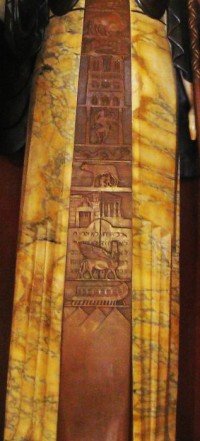
Panel on the Statue of Civilization’s robe
From bottom to top:
– Blank for unknown ages of man
– Pyramids of Egypt
– Ship for Phoenicia
– Winged Bull for Babylonia & Tablets for Judea
– Lion Gate of Palace of Ninos & Parthenon for Minoan and Grecian civilizations
– Wolf with Romulus and Remus for Rome
– Dragon for China
– Siva for India
– Notre Dame for Medieval Christian Europe
– Plumed Serpent Head for Maya
– Buffalo, Covered Wagon, and Liberty Bell for United States of America
Once again, these civilizations were chosen for their importance in Masonic history as they are known to have passed down occult mysteries. The blank space at the bottom-most probably refers to Atlantis, the lost civilization, which, according to occult texts, was at the origin of Hermetism. The building representing Medieval Christian Europe, Notre Dame de Paris, was built by the Knight Templars, the order considered to be the ancestors of modern Freemasons.
The Sphinxes
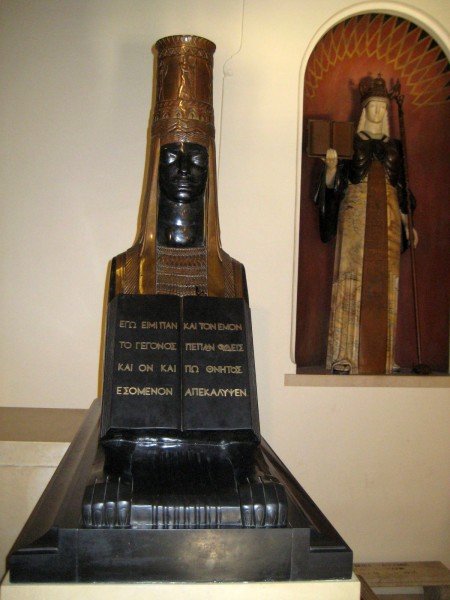
One of the Sphinxes guarding the Statue of Civilization
In occult symbolism, sphinxes are the guardians of the Mysteries, protecting esoteric secrets from the eyes of the profane. The official website of the Library describes the sphinxes:
“In black unveined Belgian marble with bronze headdresses, the sphinxes symbolize the hidden mysteries of knowledge and guard the approach to the Statue of Civilization.”
– Source
Each sphinx carries a book containing quotes from Plutarch’s Morals (“On Isis and Osiris”)
Left Sphinx – “I am all that was and is and is to be and no man hath lifted up my veil.”
Right Sphinx – “Therefore the desire of Truth, especially of that which concerns the gods, is itself a yearning after Divinity.”
The first quote is incredibly significant in Masonic mysteries as Illumination is metaphorically equated to the “lifting of the veil of Isis”. For this reason, Freemasons dub themselves the “Widow’s Sons”, the widow being Isis, the goddess who lost her husband Osiris.
“Though few ever discovered her identity, she was Sophia, the Virgin of Wisdom, whom all the philosophers of the world have wooed. Isis represents the mystery of motherhood, which the ancients recognized as the most apparent proof of Nature’s omniscient wisdom and God’s overshadowing power. To the modern seeker she is the epitome of the Great Unknown, and only those who unveil her will be able to solve the mysteries of life, death, generation, and regeneration.”
– Manly P. Hall, The Secret Teachings of All Ages
The second quote sums up the entire purpose of occult secret societies: to seek godliness through the knowledge of the Mysteries.
The symbolism of these sculptures is therefore extremely powerful and revealing: Civilization, the force behind nations, politics, culture, economics, and citizenship is guarded by the symbol of the Mysteries. The statue basically says: Secret societies have guided the evolution of civilization since ancient times and will continue to do so.
The Star of Ishtar
Embedded in the floor, at a central point of the Library, is an eight-pointed star, a symbol known as the star of Ishtar.

A version of the ancient Mesopotamian eight-pointed star symbol of the goddess Ishtar (Inana/Inanna), representing the planet Venus as morning or evening star.
Ishtar is the Assyrian and Babylonian goddess of fertility, love, war, and sexuality and is considered by the Babylonians to be “the divine personification of the planet Venus. The story of her descent into the underworld in search presumably for the sacred elixir which alone could restore Tammuz to life is the key to the ritual of her Mysteries. Perhaps for this reason, the symbol of the star of Ishtar is often found in the lower levels of occult buildings, such as the Manitoba Legislative building. Does this symbol represent the underworld?
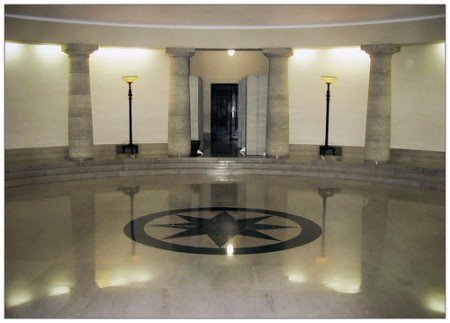
The star of Ishtar at the Manitoba Legislative Building
In Conclusion
To most people, the Los Angeles Public Library is nothing more than a functional building, which happens to be beautifully ornamented. When one understands the occult symbolism displayed around the complex, the Library turns into a temple of illumination, dedicated to occult mysteries and Masonic principles. It is a celebration of the accomplishments of the Luciferian elite and of the prevailing of its occult philosophy. The fact that the library is dedicated to secret societies, despite the fact that the LAPL is publicly funded, tells volumes about the true nature of America’s power.
After reading this article, some might ask: “If seeking knowledge is a Luciferian trait, and if Lucifer is traditionally associated with evil, does it mean that seeking knowledge is wrong?”. Heck no. Seeking knowledge will never be wrong and being ignorant will never be right. Knowledge leads to wisdom and discernment while ignorance leads to confusion and bewilderment. Furthermore, it is only by fully understanding the forces at work in the world that one becomes in a position to truly accomplish good in society. Conversely, an ignorant person can easily be manipulated by deceivers to become their unknowing accomplices. No matter what term is used to describe the search for Truth, it will always be the noblest of deeds, regardless of one’s creed or religion. The faculties of learning and understanding are not the exclusivity of one group of people. They are gifts endowed to all humans and it is our duty to make the most of them. The most important thing to consider is this: Do you use knowledge to guide, inspire and enlighten or do you use it to control, manipulate and deceive? We have seen in previous articles how the elite uses their knowledge to manipulate the masses. What will you do with yours?
- TikTok video shows links to Elon's "everything" app and the mark of the beast system.
- Trump buying Greenland?
- Biden opens federal land for A.I. takeover …
- TikTok ban and migration to Red Note is leading many to sympathize with communist China.
- Regarding my previous post…
- Regarding my previous post…
- DOGMAN – THE MOVIE 2025
Get an e-mail notification as soon as a new article is published on The Vigilant Citizen.
-

 Pics of the Month3 months ago
Pics of the Month3 months agoSymbolic Pics of the Month 10/24
-

 Movies and TV2 months ago
Movies and TV2 months agoAdrenochrome and Ritual Humiliation: The True Meaning of the Movie “The Substance”
-

 Latest News2 months ago
Latest News2 months agoKamala’s Campaign Was Objectively the Worst in Recent History
-
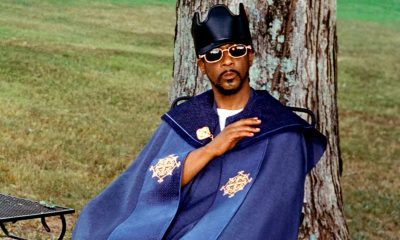
 Pics of the Month1 month ago
Pics of the Month1 month agoSymbolic Pics of the Month 12/24
-

 Latest News2 months ago
Latest News2 months agoWas the Jake Paul vs Mike Tyson Fight a Humiliation Ritual?
-

 Latest News3 months ago
Latest News3 months agoAn “Urban Opera” in Toulouse Using Massive Machines is Denounced as a Satanic Ritual
-

 Latest News1 month ago
Latest News1 month agoIt Was Bound to Happen: Jay-Z Accused of Abusing a 13-Year-Old Girl
-

 Movies and TV4 weeks ago
Movies and TV4 weeks agoThe Hidden Meaning of “Smile 2”: It’s About Monarch Mind Control
